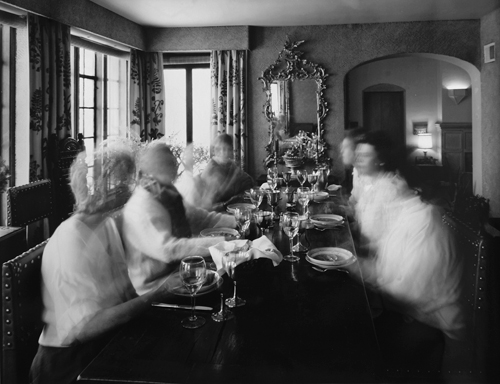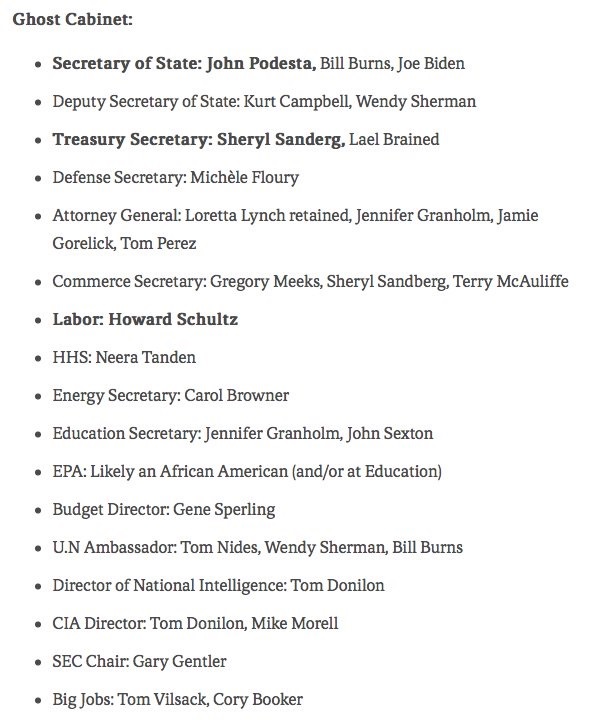Former Politico staffer Mike Allen published a leaked list of what he says are the names of individuals who were being considered for Hillary Clinton Cabinet jobs.
Nobody knows if the list is accurate or genuine, but Allen is well connected, and many assume it is. For the purpose of the Ethics Quiz, we will also assume the list is authentic, but whether it is or not doesn’t matter regarding the ethical principles involved. Here is the list:
No, the quiz query does not involve The Horror of John Podesta for Secretary of State. Note rather the 11th bullet point: “EPA: likely an African-American (and/or at Education).”
Your Ethics Alarms Ethics Quiz of the Day is this:
Is it ethical to make race the primary qualification for a Cabinet post?
Unlike many Ethics Quizzes, I ask this knowing my answer well, and feeling that it is nearly unshakable: No. It isn’t ethical. The duty of a President is to choose the most qualified candidate for any job, and to believe that the individual’s performance will best serve the nation. Is seeking a Cabinet that appears diverse a legitimate and worthy goal? Absolutely. Is it so important that it justifies quotas? No, never. Clinton’s list exemplifies what is so repugnant about the obsession with group identification in some ideological corners.
I am interested in other views.
As an aside, it appears that those ideological corners themselves are uncomfortable with the naked color-preference expressed by the “Ghost Cabinet” list. Only one liberal-minded publication (that I could find) has reported on the list, and that one, Slate, conveniently ignored the EPA entry. All the other publications and websites that revealed the list hailed from the Right, which, of course, jumped on the “likely an African-American” description.
___________________
Sources: Washington Examiner, Heat Street


This is a slam-dunk. No. If it is wrong to discriminate against a person because of race, it cannot be right to favour a person because of race.
I can’t see any possible way to consider that ethical. Agree totally with Harry. Additionally, suppose Hillary had won, a totally qualified African-American was nominated for one or both of those positions and then this list surfaced. I think were I in that position I would be more than a little pissed at the shadow that would be cast on my qualifications and reason for nomination.
Exactly!
Obviously, unethical. I’d love to backtrack how they arrived at EPA for a likely position – just the last unclaimed position, or was there some statement to be made?
The Podesta emails contained a similar instance in connection with staffing the campaign hierarchy: https://wikileaks.org/podesta-emails/emailid/2507 .
I wonder how many are Clinton Foundation “donors”?
Jack, this is the second time I’ve seen Joe Biden’s name thrown out there as Secretary of State, the first was a love letter (news article) to Clinton saying that with her you were getting Joe as well. It was obvious to me that she cut in front of his run for president with that offer. Guess Sanders rubbed her the wrong way to get anything.
When I was at work once, I mentioned how I wanted to see more female directors make Hollywood action movies. A coworker, a woman, asked me, “What difference would that make, if the director is a woman or not?”
A bit disarmed, my answer came: “We won’t know until it happens.”
Respecting diversity is a mighty tricky game. Jerry Seinfeld said, about his show Comedians in Cars Getting Coffee, that someone noticed how he had very few non-white comedians or female comedians on his show. He said, “Well, if I think you’re funny, I’ll bring you on. If I don’t, I won’t.”
Now, the question thus becomes: does Jerry think certain people are funnier than others because of whatever small biases he might have towards comedians who are like him? Or is he being completely fair in his assessment towards other comedians? Only the man himself could answer this accurately.
Furthermore, would making everyone in your cabinet too similar mean you would have a strong weakness in an unforeseen category? In Ghost in the Shell, the reason why not everyone has a cyborg body is so they don’t have everyone thinking the same way and breeding in weakness. Could simply having different ways of looking at things, which may come from different backgrounds of any kind, be a good thing to make a robust and thoughtful cabinet?
I’m almost surprised at myself for bringing this up, because the whole compulsory diversity thing is not my bag. Nevertheless, if a President selects their cabinet and they are all alike in one particular criterion or another, be it race, gender or even their education level or income… has that President really looked at all the candidates evenly? Or did they really do it, and it just happened to shake out that way and we shouldn’t give it too much significance?
So long as some rigor and analysis is applied to cabinet selection, and that there is no impression of candidates being selected arbitrarily, be it because of race or any other reason, I’m essentially fine with whatever selections they make.
I have given a lot of thought to the question, “Is diversity a virtue?” I WANT diversity to be a virtue, because it is a beautiful thing. But my logic-brain won’t allow it. Diversity has nothing to do with virtue, and uniform skin color has nothing to do with vice. And, of course, the reverse is also true.
I think of diversity as an aesthetic value. It adds beauty and heart, and if you are in leadership and you happen to have a diverse team, that makes a powerful and lovely statement about unity and mutual respect. But a diverse team is no less likely to be corrupt, lazy, unqualified, or even criminal. Just as a racially homogenous group is no less likely to be effective, honorable, tolerant, and wise. Skin color and ethnic background truly do not matter in any way that I care about when it comes to getting a job done.
It matters because in the public eye, I think that diversity is being seen as not only welcome (good) but a virtue (mistaken) and this allows certain parties (cough Democrats cough) to present a crooked, ineffective, and easily-manipulated bunch of cronies to the public as virtuous purely because they are a DIVERSE bunch of crooked, ineffective, and easily-manipulated cronies. And as long as the opposition is less diverse, they can be cast as less virtuous, no matter how factually untrue that may be. The public should not accept diversity as a substitute for competence.
Diversity is absolutely a virtue, if you are being honest about what “diversity” is: diversity of thoughts and ideas.
In college, I was a Computer Science major. At the time, there was one particular classmate whom I loved working with. Why? Because he and I would be presented with the same assignment, and in the vast majority of cases we would think up completely different ways to solve the problem.
It was a beautiful thing. His solutions and mine would both be practical, valid solutions. Then we would have a short conversation to compare and contrast, decide on which way to do it, and off we went.
I learned more from that classmate than many of my other professors.
THAT RIGHT THERE is what “diversity” means to me. It was 100% objectively a virtue.
Where the rhetoric about diversity goes off the rails is when we get over-concerned about the source of it (differing life experiences caused by differences in upbringing caused by differences in race) and ignore the actual results and benefits of it. If we can stop “putting the cart before the horse” we can actually reap the benefits of diversity.
–Dwayne
P.S. That classmate was a white male, just like me.
Couldn’t agree more. Although I suppose a tolerance and openness to a diversity of ideas and perspectives is what I would call a virtue, so that good ideas have a chance to stand out from the bad. Race seems like just about the most useless thing to focus on when talking about “diversity,” since people of different racial backgrounds can often think exactly the same and therefore offer no value of different perspectives at all.
Is it ethical to make race the primary qualification for a Cabinet post?
No, but I don’t see any evidence that race was the “primary” qualification here. It says “Likely an African-American,” not “Absolutely must be an African-American.”
I don’t find it unethical to consider diversity among other factors, which is what the word “likely” means to me. Making diversity a “primary” qualification is how Republicans got Ben Carson and Herman Cain, two presidential candidates who conservatives only considered qualified because they were black Republicans.
b..bu…but Jack: don’t you believe in affirmative action?